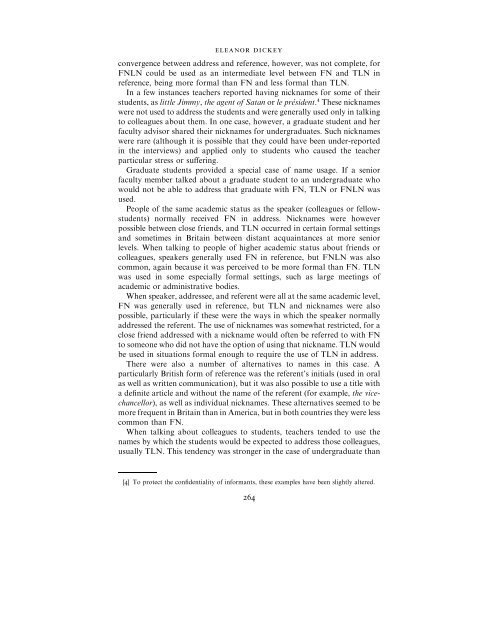Forms of address and terms of reference - Exeter Research and ...
Forms of address and terms of reference - Exeter Research and ...
Forms of address and terms of reference - Exeter Research and ...
Create successful ePaper yourself
Turn your PDF publications into a flip-book with our unique Google optimized e-Paper software.
eleanor dickey<br />
convergence between <strong>address</strong> <strong>and</strong> <strong>reference</strong>, however, was not complete, for<br />
FNLN could be used as an intermediate level between FN <strong>and</strong> TLN in<br />
<strong>reference</strong>, being more formal than FN <strong>and</strong> less formal than TLN.<br />
In a few instances teachers reported having nicknames for some <strong>of</strong> their<br />
students, as little Jimmy, the agent <strong>of</strong> Satan or le pre sident. These nicknames<br />
were not used to <strong>address</strong> the students <strong>and</strong> were generally used only in talking<br />
to colleagues about them. In one case, however, a graduate student <strong>and</strong> her<br />
faculty advisor shared their nicknames for undergraduates. Such nicknames<br />
were rare (although it is possible that they could have been under-reported<br />
in the interviews) <strong>and</strong> applied only to students who caused the teacher<br />
particular stress or suffering.<br />
Graduate students provided a special case <strong>of</strong> name usage. If a senior<br />
faculty member talked about a graduate student to an undergraduate who<br />
would not be able to <strong>address</strong> that graduate with FN, TLN or FNLN was<br />
used.<br />
People <strong>of</strong> the same academic status as the speaker (colleagues or fellowstudents)<br />
normally received FN in <strong>address</strong>. Nicknames were however<br />
possible between close friends, <strong>and</strong> TLN occurred in certain formal settings<br />
<strong>and</strong> sometimes in Britain between distant acquaintances at more senior<br />
levels. When talking to people <strong>of</strong> higher academic status about friends or<br />
colleagues, speakers generally used FN in <strong>reference</strong>, but FNLN was also<br />
common, again because it was perceived to be more formal than FN. TLN<br />
was used in some especially formal settings, such as large meetings <strong>of</strong><br />
academic or administrative bodies.<br />
When speaker, <strong>address</strong>ee, <strong>and</strong> referent were all at the same academic level,<br />
FN was generally used in <strong>reference</strong>, but TLN <strong>and</strong> nicknames were also<br />
possible, particularly if these were the ways in which the speaker normally<br />
<strong>address</strong>ed the referent. The use <strong>of</strong> nicknames was somewhat restricted, for a<br />
close friend <strong>address</strong>ed with a nickname would <strong>of</strong>ten be referred to with FN<br />
to someone who did not have the option <strong>of</strong> using that nickname. TLN would<br />
be used in situations formal enough to require the use <strong>of</strong> TLN in <strong>address</strong>.<br />
There were also a number <strong>of</strong> alternatives to names in this case. A<br />
particularly British form <strong>of</strong> <strong>reference</strong> was the referent’s initials (used in oral<br />
as well as written communication), but it was also possible to use a title with<br />
a definite article <strong>and</strong> without the name <strong>of</strong> the referent (for example, the vicechancellor),<br />
as well as individual nicknames. These alternatives seemed to be<br />
more frequent in Britain than in America, but in both countries they were less<br />
common than FN.<br />
When talking about colleagues to students, teachers tended to use the<br />
names by which the students would be expected to <strong>address</strong> those colleagues,<br />
usually TLN. This tendency was stronger in the case <strong>of</strong> undergraduate than<br />
[4] To protect the confidentiality <strong>of</strong> informants, these examples have been slightly altered.<br />
264
















